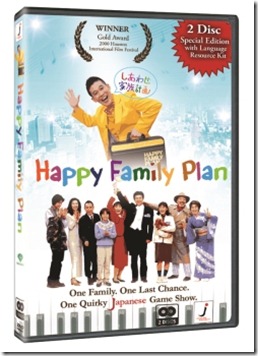The Japanese film Happy Family Plan looks at the effects of the recession on family – and how some things resonate with everyone – and add a real, quirky Japanese game show for heightened drama. The DVD release includes features that familiarise us with some of the country’s language, ritual and food. It’s an unusual and cool package.
Happy Family Plan is set during the recession of the ‘90s, when even the most successful Japanese companies were laying off their salaried employees 9known as salarymen). – though they always seemed to find a way to make it the employee’s fault.
One such unlucky salaryman is Fujio Kawajiri (Tomokaza Miura), who is fired for misuse of company funds as bribes to prospective clients – even though these ‘gifts’ were not only a part of daily business practice, but okayed by his superiors. He also loses the company apartment his family lives in and the Kawajiris are forced to move in with his wife’s parents – above the failing sweets shop they own and run.
It seems like Fujio just can’t get a break – even while his wife, Yuko (Eriko Watanabe) is able to acquire backing to open a small fast food restaurant that also aids her parents’ flagging business. Meanwhile, daughter Yoko (Aya Hirayama) is having trouble dealing with mean girls at her new school and son Yutaro (Kazunori Sasaki) despairs of ever being athletic. Throw in a would-be con artist and the return of Tetsuo (Hiroshi Abe) – the man Yuko could have been with, and things are not looking good for Fujio.
Then Yutaro submits his father’s name for the game show Happy Family Plan. Selected contestants are given a task to master in seven days – and must show their mastery on television. As the film opened, we saw a man on television identifying breeds of dogs as a series of shots established that he was being watched by a wide range of people across the country.
Fuijo’s task, once he decides to go along with Yutaro’s plan, is to play There’s No Place Like Home on the piano. He is shown it being played – one time – by an accomplished pianist, and then has seven days to learn to play it flawlessly (though it doesn’t have to be played at the same tempo).
As a kind of counterpoint to Fujiro’s trials, we meet a former co-worker of his, Michio Hirose (Tsurutaro Kataoka) who has also lost his job. Where Fujio is quiet and unassuming, Hirose is loud and obnoxious. Where Fujio has a family that seems to love each other, Hirose’s family is a mess. Where Fujio finds learning his task for Happy Family Plan to be a real test, Hirose is envious – and sure that if he could have been on the game show, it would solve all his problems. There is a clever plot point that ties the two families together in an unexpected manner.
Happy Family Plan is almost as quiet and assuming as a film as its lead character. It’s a film that explores the meaning of family and the impact exterior forces can have on one. It’s also a look at what it means to be a parent, or spouse – or both. It even looks at love in an uncompromising way – and how love can grow, change or disappear.
Director Tsutomo Abe doesn’t go in for flashy camera moves, or any device that might call attention to the film as a product of direction. Most of the time he frames shots for extended periods and characters move into and out of frame – giving the viewer the feeling that he’s actually observing a real family as it struggles with the events of the day.
The script, by Kota Yamada, tells a simple tale around which complexities swirl – and with a straightforwardness that allows us to get to know the main characters without even really seeming to do much.
Overall, Happy Family Plan moves at, perhaps, a bit too deliberate a pace, but is builds on universal themes – like family, responsibility and love – that we might take for granted. Some of the acting is likely too over-the-top (Hirose, for example), but some is exactly right (Fujio is more complicated than he seems and Miura nails his nuances perfectly).
Happy Family Plan is two-disc release. Disc One is the film and Disc Two is designed as a ‘Language and culture Resource:’ Language resource Kit: featurettes that help us understand some of the Japanese language, rituals and food; Expert Commentary on Japanese Society (two interviews by Australian experts Dr. Carol Hayes and Dr. Rebecca Suter) and an Interview with the Director.
Grade: Happy Family Plan: B
Grade: Features: B+
Final Grade: B
